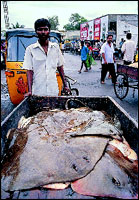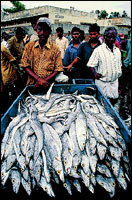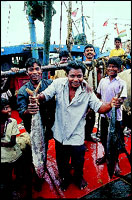


|
|
|
AT 5.30 in the morning with the first rays of dawn struggling to break out of the Bay of Bengal, we drove over to the old Vizag harbour where fishing trawlers from all over chug up reeking of diesel and fish. They have been out the night before and are now reporting at the harbour with their catch of the day and bay. It is a big moment at the harbour. The drive at that hour is extremely pleasant, it takes us into the port area, where huge ships sit out the rest of the night silently and where an old disused English lighthouse stands like a blind sentry at the mouth of the harbour.
And the stench is that of fish that has been salted and left to dry on the stone embankments of the old harbour by fisherfolk who deal in dry fish. A couple of days of the sharp Andhra sun, and the fish is nice and dry and can be stored away for months ahead.
Prawns, prawns, prawns... that's our first sight of the fish in the harbour market. Cartloads of it with fishermen lifting the catch up with their bare hands and transferring it into boxes of ice.The prawns are big, the Tiger Prawn variety, and very expensive. But to see the way the fishermen handle it, you would not think so.
Business is brisk at the hour. Fierce bargains are struck, sales are made in the thick of the activity, even as more and more trawlers gently float up and the fishermen aboard leap nimbly onto the harbour to tie the boats to the bollards and begin their sales pitch.
The activity continues, we are told, in this fashion almost until 8 a.m. when the sun is high and the day is nice and hot. By 6.30, it is already on the wane. And the fisherwomen, who are handsome people and more hardworking than the men, light up their first indigenous chiroots of the morning and take a break. The men, in the meanwhile, queue up before a cart on which, oblivious to the stench of fish and the muck everywhere, a woman is making dosas and idlis and serving it out on leaf-plates with chutney for breakfast. �This is my breakfast, lunch and dinner,� says a fisherman grinning, �the first hot meal I�m having since I went out to sea two days ago. I might catch and sell fish, but I am a vegetarian!�
|

Home Page
About the mag
Subscribe
Advertise
Contact Us

 Catch Of The 'Bay!'
Catch Of The 'Bay!'
 A lot of people are waiting for the trawlers to draw up and unload their fish. Locals who are fond of seafood, hoteliers and restaurateurs, seafood contractors who store their purchases in ice and then sell them out piecemeal to their customers, small fish vendors and ourselves.
The smell of fish is everywhere, and it is overpowering, but this is not the smell of fish being unloaded in baskets and crates from the trawlers. This is the stench of rotting fish from the day before. Strangely for a city that is so clean and environment savvy, the harbour is in one big, smelly mess.
A lot of people are waiting for the trawlers to draw up and unload their fish. Locals who are fond of seafood, hoteliers and restaurateurs, seafood contractors who store their purchases in ice and then sell them out piecemeal to their customers, small fish vendors and ourselves.
The smell of fish is everywhere, and it is overpowering, but this is not the smell of fish being unloaded in baskets and crates from the trawlers. This is the stench of rotting fish from the day before. Strangely for a city that is so clean and environment savvy, the harbour is in one big, smelly mess. We pick our way gingerly, stepping over puddles of dirty fish water, minding out for handcarts and cycle-trolleys that people are trundling about loaded with fish big and small. This is a most popular place and people draw up in fancy cars too, for their seafood shopping.
We pick our way gingerly, stepping over puddles of dirty fish water, minding out for handcarts and cycle-trolleys that people are trundling about loaded with fish big and small. This is a most popular place and people draw up in fancy cars too, for their seafood shopping. From trawlers pulled up alongside the harbour, brawny Andhra fishermen are unloading lobster and squid, black and white Pomfret, Sardine, crab, Mackerel and the Red Snapper. There are baby shark, one-and-half-feet and two-feet long, looking mean and ugly, and one fellow even holds up a swordfish for our inspection. �It came into my net,� he says almost apologetically.
From trawlers pulled up alongside the harbour, brawny Andhra fishermen are unloading lobster and squid, black and white Pomfret, Sardine, crab, Mackerel and the Red Snapper. There are baby shark, one-and-half-feet and two-feet long, looking mean and ugly, and one fellow even holds up a swordfish for our inspection. �It came into my net,� he says almost apologetically. From the depths of the trawlers, which are the cold-storage areas, they shovel out huge catches of fish. Small baskets and plastic crates are filled. These are then passed on, through a relay network of willing and helping hands, to the salesmen on the harbour.
From the depths of the trawlers, which are the cold-storage areas, they shovel out huge catches of fish. Small baskets and plastic crates are filled. These are then passed on, through a relay network of willing and helping hands, to the salesmen on the harbour.